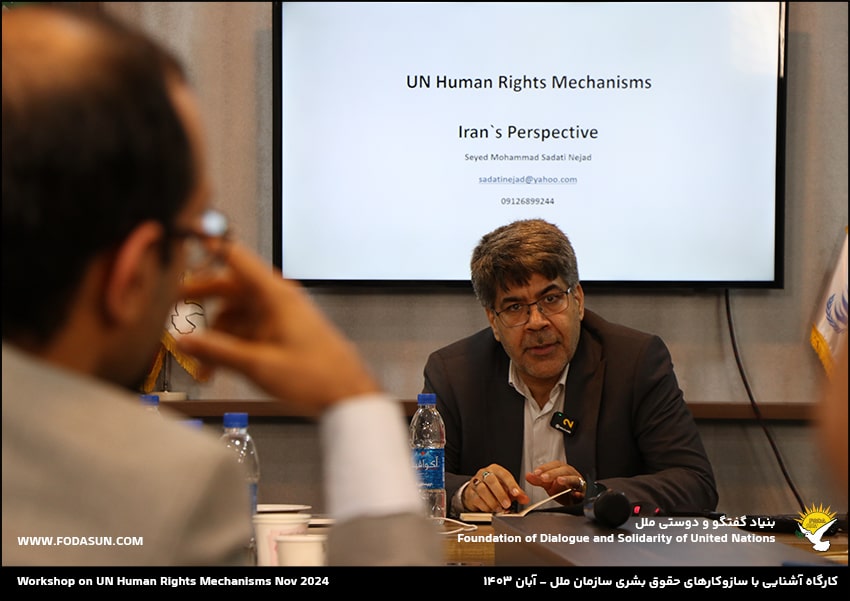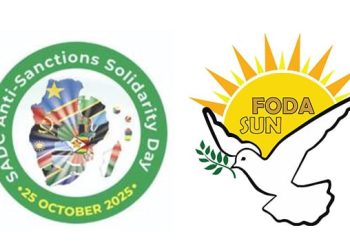Introduction: A review of the UN human rights mechanisms
There are several classifications of the UN human rights mechanisms. Based on one classification, we have two pillars of human rights mechanisms under the auspices of the General Assembly. The firs pillar refers to the “Adoption” and the second pillar refers to the “Creation” mechanisms.
Under the first category, the General Assembly has adopted 9 main human rights conventions which is called the treaty body mechanisms. There are 9 committees which are responsible to follow and monitor the implementation of each of theses conventions by member States. The second pillar refers to the creation of new structures by the General Assembly. In this line, the main new created structure is the Human Rights Council, OHCHR, and the Special Procedures and Universal Periodic Review which are affiliated to the Human Rights Council. The OHCHR role is to support the whole UN human rights mechanism. OHCHR has also its own mandate and independency in working with States and other interlocutors in line with protection and promotion of human rights.
There is another classification which introduces two category of human rights mechanisms. The Treaty based and Charter based mechanisms. The treaty based mechanisms include 9 Conventions on human rights namely ICESCR, ICCPR, CERD, CEDAW, CAT, CRC, CMW and CRPD. The Charter based mechanisms include Human Rights Council, Special Procedures and Universal Periodic Review.
Iran`s cooperation with human rights mechanisms
Iran is cooperating with human rights mechanisms. Iran has sent her fourth national report to the Human Right Committee for ICCPR last year. Iran also sent its new report on CERD to its committee this year. Iran has also delivered her fifth and sixth nation report regarding the Convention on the Rights of the Child to its committee. Iran has also delivered her report regarding the convention on disabled persons and is now working on preparing her national report to the ICSECR.
Iran has also participated actively in three previous cycles of UPR and is now preparing to deliver her 4th national report to the UPR Secretariat. Iran has delivered a mid-term report on the implementation of the UPR recommendations too.
Iran`s perspective toward human rights
1-Positions:
Iranian culture confirms human rights.Cyrus the Great, the Persian King, issued an unprecedented decree recognizing religious freedom and the rights of enslaved and exiled peoples. His words were inscribed on a clay cylinder, widely considered to be the first declaration of human rights. Islam also confirms human rights. Of course, there are some differences of opinion between the international human rights law and the Islamic human rights law. We can say that there is a silence in the part of international human rights law about the origin, aim and quality of some rights but it does not change the recognition and importance of human rights and its protection and importance in both international and Islamic human rights law. The approach of the Islamic Republic of Iran as a religious government in cooperating with human rights mechanisms, is a reason that there is no contradiction between religion and human rights. As human rights is supposed to support the rights of people and individuals against the governments, the actions and approach of government and Islamic Republic as a government is important to confirm this fact that human rights is not in contradiction with religions and islam.
2- Critics:
There are several critics by targeted developing countries, including Iran towards international human rights mechanism in particular towards the approach of the western countries in the Human Rights Council and the General Assembly. We refer to these critics which are as follows:
1-Politicization of human rights: There are several country specific mandates against targeted countries which are acting against the policies of the western countries, while the western countries are silent or less sensitive and ignorant about violations of human rights in or by their allied countries.
2-Weaponization of human rights: The western countries are misusing human rights as a weapon to destruct the image of the targeted countries and put pressure on them to change their polices and to force them to submit in front of powerful states.
3-Double standardization approach towards human rights: The western countries are silent or ignorant towards serious violations of human rights and human crimes by Israel in Gaza and Lebanon within the Human Rights Council and General Assembly. This is while they have in their record, the request for holding Special Sessions of the Human Rights Council for situations which were not comparable with the violations and crimes committed by Israel in Gaza.
4- Commercialization of human rights: The western countries are devoting so much time, effort and money to advertise the right of LGBTQI while they are not focusing the same attention on the rights of the vulnerable groups such as disabled persons, aged, childes, etc.
5- Mutilization of human rights: There are several rights such as the right to be protected against the negative impacts of unilateral coercive measures, right to be protected against racial discrimination and right to development which the western countries prefer to talk less about them/ ignore them or not to promote them in a way that they promote civil and political rights. Some western countries even hesitate to consider some of these rights as human rights. In addition to that, the western countries prefer not to address the rights which refer to the spiritual or non-secular aspects of human such as the right to be moral or the right to Chastity.
6- Distotrtization of human rights: The western countries create or support efforts or mechanisms which prevail negative cliché and twisted narratives against some targeted States. They have a black and white approach and do not pay enough attention to the positive aspects of the developments in protection of rights in targeted countries. This approach is not in favour of protection and promotion of human rights, in general.
7- Hegemonization of western narrative of human rights: Though the human rights are universally promoted and accepted by all countries but western countries are trying to dominate their narrative of the quality of the rights and to highlight some chosen rights because it is important for the western societies and to ignore those rights that are more important for the developing societies and less important for the western developed societies.
Evaluation and conclusion:
Examining the history of Iranian authorities approach and view toward human rights mechanism confirms a radical pessimistic approach in most of the times toward human rights mechanisms. This reality is the result of the discriminative approach adopted and imposed on human rights mechanisms by western countries towards situation of human rights in the Islamic Republic of Iran.
There is a need to differentiate between western States` behaviour in politicization of human rights and the actions of human rights mechanisms per se. The human rights mechanisms are forced to implement and follow the decisions and resolutions adopted by the members of the Human Rights Council. They cannot refuse to implement decisions and resolution adopted by States.
Developing countries including Iran can adopt a policy in line with promotion of cooperation with those mandates which are emanated from resolutions tabled in HRC and adopted by the support of developing States and those resolutions adopted by geographical groupings belong to the developing countries such as NAM, OIC, etc. In that regard, we can refer to mechanisms such as Special Rapporteur on the Right to Development, Expert Mechanism on the Right to Development, Working Group on the Right to Development, International Expert on the Promotion of a Democratic and Equitable International Order, Special Rapporteur on the negative impact of UCMs on enjoyment of human rights, etc.
The human rights mechanism in spite of all critics from developing countries has the capacity to help developing countries in promoting and protecting of rights in particular the second and third generation of human rights. Just as some example we can refer to the important mandate of the SR on UCM, and her recent report including her recent visit to Iran on 2022. She has been one of the key persons in highlighting the negative impacts of UCMs on the enjoyment of human rights. She introduced UCMs in clear violation of human rights.
Another example is Agnes Calamard`s report in 2020 on the assassination of Shahid Soleimani and introducing the assassination as the violation of three packages of international, humanitarian and human rights laws.
In spite of the complexities and the politicization of human rights by western States to impose a mandate against Iran in HRC, the Islamic Republic of Iran needs to work with SR on Iran to de-instrumentalise the mandate by western States. This will not be the first time to do such engagement. Iran has adopted a same approach with some previous SRs such as Copithome and Galindo Pohl.
Iran needs to work with OHCHR and to boost its bilateral cooperation with the Office. The more the Office is aware of the real situation in Iran, the more it can resist against politicized mandates and try to balance the approach of human rights mechanisms against Iran. Even, having human rights advisors in the UN Office in Iran, working with UN resident Coordinator can also help the Office to have a realistic view about the realities in Iran and avoid prevailing twisted narratives.
Iran also needs to join the remaining main human right treaties like CEDAW and CAT and to update the outstanding reports to the TBs like the outstanding report to the ICESCR. The interaction and engagement of Iran with treaty bodies committees is key in reflecting the real situation of human rights in Iran and rectify the radical negative twisted narrative about situation of human rights in Iran and to resist the huge negative propaganda by the opposition groups to destruct the picture of the Islamic Republic of Iran.
Iran also needs to establish asap the national institution on human rights. The existence of the institution is key in promotion and protection of human rights in any country.
Dr. Seyed Mohammad Sadati Nejad




